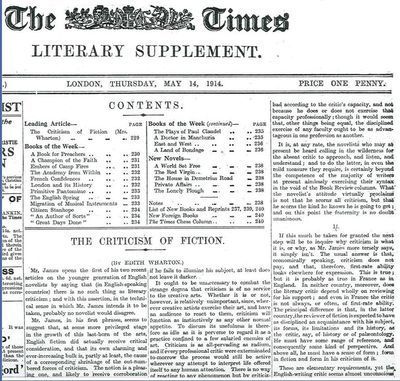Does the TLS have (a) style?
By ADRIAN TAHOURDIN
I only ask what may seem a rather self-regarding question because I was recently made aware of the existence of an essay entitled “Sur le style du Times Literary Supplement” by Maxime Cohen. (Thank you to TLS reader and contributor George Walden for the tip-off.)
The essay appears in Promenades sous la lune (Grasset), a wide-ranging collection, as the titles suggest: “Petit éloge des ordinateurs” (in praise of computers), “Des vins”, “De la plus courte scène érotique de la littérature française”, “Au sujet d’Aristote”. Cohen, who is (or at least was when the book appeared in 2008) a librarian in Paris – well, more grandly, “conservateur général des bibliothèques” – is an essayist of the old school, prefacing his pieces with well-chosen epigraphs and eschewing an index. His “Propos sur l’e muet” (on the silent e) is particularly well turned and opens: “L’e muet ou muette est la plus grande beauté de la langue française”. And in this case the epigraph, from Voltaire writing to M. Deodati de Tovazzi on January 24, 1762, is so good that I quote it in full:
Vous nous reprochez nos e muets comme un son triste et sourd qui expire dans notre bouche; mais c’est précisément dans ces e muets que consiste la grande harmonie de notre prose et de nos vers. Empire, couronne, diadème, flamme, tendresse, victoire; toutes ces désinences heureuses laissent dans l’oreille un son qui subsiste encore après le mot prononcé, comme un clavecin qui résonne quand les doigts ne frappent plus les touches.
(roughly translated: “you reproach us our silent es as a sad and mute sound that expires in the mouth; but it’s precisely in these silent es that the great harmony of our prose and verse consists . . . ; all these happy word endings leave a sound that continues after the word has been uttered, like a harpsichord that resonates after the fingers have touched the keys")
The TLS essay turns out not to be particularly about the paper’s supposed style and more about the English essay tradition (but it’s good to know that a reader as discriminating as Cohen clearly sees the paper). He does point out how a TLS reviewer will “patiently pick out the errors of a historian who is in all other respects an established academic”. That rings true enough.
But is there such a thing as TLS style? A hundred years ago, as the excerpt at the top of the post shows, there was a certain formality: Mrs. Wharton’s repeated references to “Mr. James” would grate on the modern ear, and we are not told that the Mr. James in question is Henry James – obvious though it would have been to readers at the time.
I should say that I don't have an objection to the use of "Mr" or "Mrs" in a review – indeed it's sometimes appropriate and displays old-fashioned courtesy (rather than heavy sarcasm). But it can pall if it appears repeatedly.
When I started out on the paper, I was told that we referred to authors reviewed initially by their full name, and then by their title and surname and then just by the surname, before rounding off with the full name. The latter strikes me as unnecessary and liable to produce a jarring effect in a concluding paragraph – we don’t bother with it now – but we will, I hope, always overrule the occasional academic tendency to refer to authors just by their surnames from the outset.
The Times recently had a style overhaul, dispensing with what they saw as redundant capitalizations. Maybe we’re a little bit guilty of this at the TLS, i.e. “the West”, and should think again. It is the 21st century after all. Watch this space.
Peter Stothard's Blog
- Peter Stothard's profile
- 30 followers




